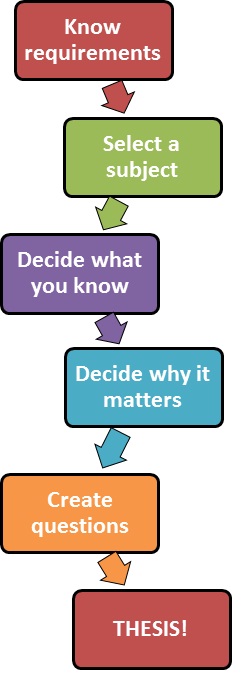The thesis of your paper is the main point that you want to get across to the reader and support with reasons and evidence. Creating a good thesis requires planning and drafting.
Follow these steps to help develelop a good thesis for your paper.
 Know the requirements for your project
Know the requirements for your project
Before getting started, know what the writing assignment is asking you to do. Read it several times. Try to explain it to yourself and write it in your own words. If you are not sure what the assignment is asking you to do, talk with your professor or a Writing Center tutor.
Select a topic
After knowing what your assignment is asking for, decide what overall topic or subject you would like to choose for your paper.
Decide what you know or need to know about your topic
Decide whether or not you have a good understanding of your subject. If you don't, this will be your opportunity to learn more about it. Plan a trip to the library, or check out online sources from the library's website. Consider your audience and what they know or do not know about your topic.
What is significant about your topic?
It is important to ask yourself what is significant about your topic and why readers should care about what you are writing about. Remember that you are writing your paper not only for a grade; you are writing it to demonstrate that you can learn on your own, think through the issues, and convey your ideas in a clear and cogent manner.
What questions can you create about your topic?
Think about the different questions that you can create about your subject. Decide which questions pertain to the information you have about the topic.
What is your thesis?
Using the steps above, decide what your thesis will be. Think of a thesis that answers the questions you created about your topic. Keep in mind that a thesis requires support, not absolute proof.
Many students think that discussing a topic by mentioning facts and giving opinions is good enough to support a thesis statement, but there is more to it than this. It is important that you make a claim and focus your paper on supporting this claim. This will give readers a clear sense of the point of your paper.
Examples of weak thesis statements:
- “In this paper, I will talk about healthcare, immigration, and tax reform.” (These topics are too broad and there are too many of them.)
- “There are some negative and positive aspects to online learning.” (This is an introduction to a list rather than a thesis.)
- “Huckleberry Finn is a great American novel.” (This claim is overly broad. It is better to choose something specific about the novel that makes it great.)
Examples of strong thesis statements:
- “America's health care system requires greater accountability by hospitals, doctors, and patients.”
- “Online learning should not be used in K-12 education because it inhibits the learning of important social skills.”
- “Twain's Huckleberry Finn suggests that to find the true expression of American democratic ideals, one must leave civilized society and go back to nature.”